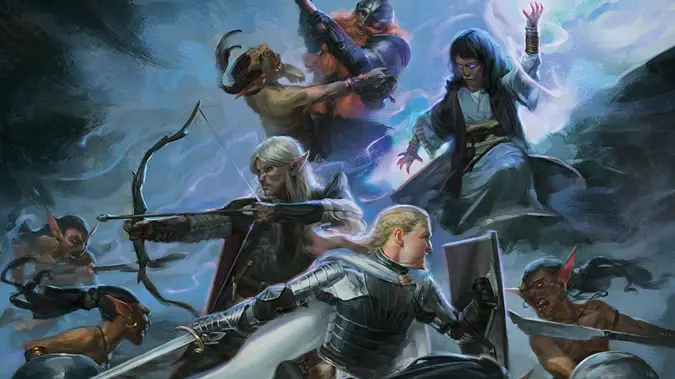Learning when to say no, and when to say yes, when DMing a tabletop RPG

One of the biggest pitfalls for novice game masters of any tabletop RPG is knowing how and when to say no to players. It’s an art form, really, and it’s one that takes time to master. Even people who’ve been doing it for years screw it up sometimes.
I’m talking about myself. I screw it up.
So we’re going to talk about the social subtleties of running a RPG for people and how to avoid some of the easiest pitfalls. We’ve talked about improvising as a DM before, and that’s a useful skill, but this is less that, and more about knowing your group and yourself.
So how do you learn how to tell your players no?

Remember, this is not adversarial
For starters, and I cannot stress this enough, you will occasionally make a ruling that your players won’t like. That’s okay. It’s not a bad thing for you to tell the Rogue that while she may be very very sneaky, she is not sneaky enough to tapdance past Orig-Thal, She of the Thousand Ears, as she is going to hear it. No, don’t even bother rolling that stealth check. Not even a crit is going to make you quiet enough, it’s a literal demigod of hearing things. Running a game means that yes, sometimes the rules are going to say no, and it’s your job to enforce those rules.
Now, since you already know that’s your role, be extremely careful with how you do it. I’ve seen DM’s lose their temper and it’s never pretty — I’ve even been the DM losing my temper at times. While these things happen, they make for extremely bad feelings over what’s supposed to be a fun time for everyone. Everyone includes you, by the way. You’re a player, too. So try and keep the rules adjudication as fair and impartial as possible.

You are here to play a game together
A real problem that a lot of DM’s get sucked into after a few sessions is the god complex. The whole This is my game, dance to my tune, puppets mentality. You need to divest yourself of that one right away. The only time it’s your game is if you’re the only one playing. If you have a group of players, it’s everyone’s game. Now, for ease of shorthand, I often refer to games I’m running as my game — that’s fine, I’m not saying you have to be meticulous about that. But always remember that without your players, you have no game.
How does this translate to effectively running the game? Well, for starters, pay attention to your players. Are they all bored stiff by the elaborate courtly intrigue you’d intended to be the focus of the session? Are you twenty minutes into the great masquerade ball at the Dowager’s mansion and no one is interacting? Have you just spent three days doing a flow chart of every character’s interactions only to discover that your group of dungeon crawlers has no interest in Prince Florian’s unrequited love for Marshall D’Avaragne? Don’t be afraid to change it up. Open up your notes, find a suitable monster and drop it right into the middle of the ball. They like fighting? Give them a fight. Likewise, if you had only planned a few encounters at the ball before moving on, but your players are loving all the catty NPCs? Roll with it.

Trying to please everyone includes you
The phrase give the people what they want should absolutely be one you live by as a DM. However, there is a codicil here — you are a player too. This means giving yourself things you want and paying attention to how they work out. For example, that courtly intrigue thing I mentioned above? You never know when your group of smash monsters get loot players will embrace some crazy thing like a party full of snooty rich folks. If you want to try it — as long as you’re not going to hammer it into the ground and force your players to stay in it long after they’ve demonstrated that they’re not enjoying it — why not experiment? Try that weird idea that they may hate, just don’t make them stay there once it’s no longer a may — once it’s clear that they do hate it, shift gears.
Besides being sure to adjudicate the rules fairly and in as even-tempered a manner as possible, and being willing to experiment but also to shift gears if an experiment fails, one thing I really want to talk about here is how to handle a player who knows the rules better than you. This is going to happen. Yes, even if your name is Jason. For whatever reason, every single player named Jason I’ve ever known has the rules cold, I don’t know how this happens. Regardless, eventually a Jason will meet another, even more Jasony Jason, and you’ll be in a situation where someone is quoting the rules at you to justify doing something you absolutely don’t want them to do.
There are multiple ways to handle this. The first is to defer. This one is the hardest for most DM’s, especially when you’ve just started. It’s your game, and they’re telling you how to run it? Not on your watch!

Knowing when to say yes
However, restrain that first impulse. Actually listen to what your player is saying and really think about it. If it’s a situation where you can make it work, go ahead and let that Rogue sneak past Orig-Thal because the Wizard has cast a Silence spell on her. After all, Demigod of hearing or not, there’s at least a chance that a magically silenced Rogue should be able to sneak past her. It’s okay to let your players feel like they did something clever, especially when they did. But if you want to just move on and feel like all the rules quoting is taking up too much time? It’s okay to say Okay, I’ll look at that later but right now, it’s not going to work.
The fact is, no DM is ever going to remember every single rule and edge case and that’s okay. You’re there to run the game and have fun. If your players manage to use the rules to their advantage, that’s what the rules are for, ultimately, as long as they’re not being obnoxious about it. Sometimes you absolutely will have to say no to your players. But sometimes, you can say yes, and when it works out it makes for some amazing game stories down the road.
Learn when to say no and when to say yes.
Originally posted 4/15/2020. Updated 11/17/2021.
Please consider supporting our Patreon!
Join the Discussion
Blizzard Watch is a safe space for all readers. By leaving comments on this site you agree to follow our commenting and community guidelines.
 @MatthewWRossi
@MatthewWRossi



